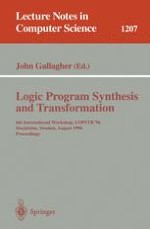1997 | ReviewPaper | Chapter
Conjunctive partial deduction in practice
Authors : Jesper Jørgensen, Michael Leuschel, Bern Martens
Published in: Logic Program Synthesis and Transformation
Publisher: Springer Berlin Heidelberg
Included in: Professional Book Archive
Activate our intelligent search to find suitable subject content or patents.
Select sections of text to find matching patents with Artificial Intelligence. powered by
Select sections of text to find additional relevant content using AI-assisted search. powered by
Recently, partial deduction of logic programs has been extended to conceptually embed folding. To this end, partial deductions are no longer computed of single atoms, but rather of entire conjunctions; Hence the term “conjunctive partial deduction”.Conjunctive partial deduction aims at achieving unfold/fold-like program transformations such as tupling and deforestation within fully automated partial deduction. However, its merits greatly surpass that limited context: Also other major efficiency gains can be obtained through considerably improved side-ways information propagation.In this paper, we present a first investigation of conjunctive partial deduction in practice. We describe the concrete options used in the implementation(s), look at abstraction in a practical Prolog context, include and discuss an extensive set of benchmark results. ¿ From these, we can conclude that conjunctive partial deduction can indeed pay off in practice, beating its conventional precursor on a number of small to medium size programs. However, controlling it in a perfect way proves far from obvious, and a range of challenging open problems remain as topics for further research.
